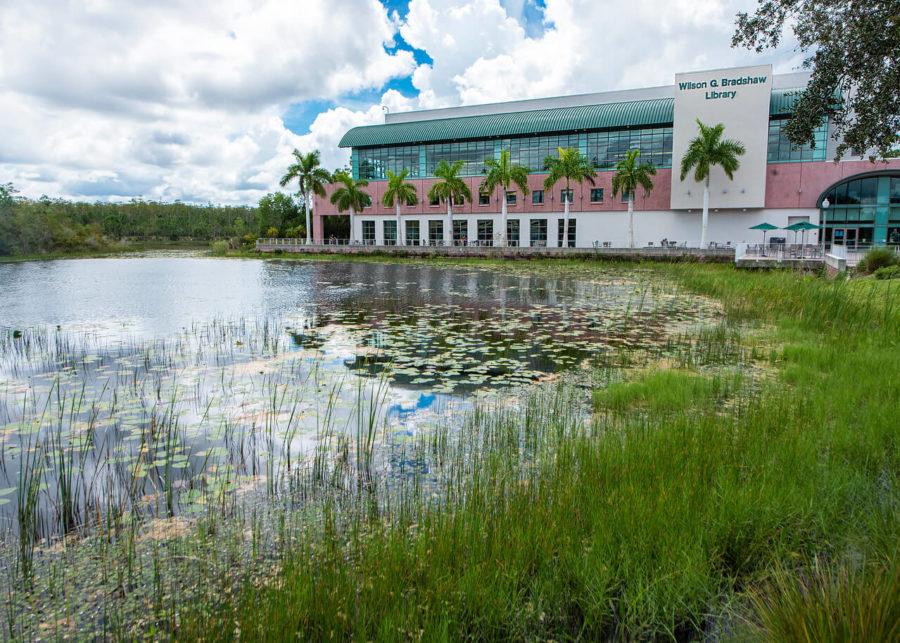By Samantha Roesler
Eagle News Editor
FGCU has recently been recognized as the 32nd most green school in the country by the Princeton Review, and the only green school listed that was located in Florida. As the university grows, the effort given by the FGCU school community to remain ecologically friendly is higher than ever.
For Dr. Jennifer Jones, the Director for the Center of Environmental and Sustainability Education, this ranking was not a surprise.
“From the day FGCU was founded it had an environmental theme,” Jones said. “You can see it in that the campus has 400 acres of conservation. That’s a sizable chunk of the university that’s protected.”
When walking FGCU’s campus, students will find themselves surrounded by tropical trees and ponds and all the wildlife imaginable for Southwest Florida. Those green spaces are not only there for attractiveness—teachers utilize this space as grounds for learning.
“It’s a natural lab,” Jones said. “We use it for teaching courses, and there’s a whole team of student naturalists that lead hikes and activities and wet walks. Its been part of the university campus and culture for many years, to me that’s something really special.”
All students are required to spend time learning about the ecosystem that surrounds them at FGCU through a three-credit colloquium course. This course has been a requirement for 20 years and originally focused solely on environmental sustainability, but now aims to teach students about the three legs of the sustainability stool: environmental, economic and social.
“There’s no other university in the country that requires its students to take a three-credit colloquium to graduate,” Jones said. “I’m sure that was one of the metrics that helped us to get that ranking.”
Although it seems out of question of whether or not FGCU is doing an optimal job in terms of being a sustainable campus, some students like Sam Schwippert, a senior at FGCU majoring in both marine science and environmental studies, have their suspicions.
“You hear a lot of things from being in the (environmental science) major, but you also see things that are a little suspicious, like the size of the water school,” Schwippert said.
The water school, which officially broke ground almost a year ago, will cover over 100,000 square feet and is projected to be finished in spring of 2021.
“FGCU does a darn good job on its newer buildings,” Jones said. “Many are LEED certified which is essentially a green building certification. We don’t always reach the highest level of certification for buildings so that’s a place we’d like to improve.”
Having greener infrastructure is an ideal scenario for FGCU, but it is highly cost dependent.
“In terms of getting to that last and highest level (of LEED certification) it can cost a lot of money which can affect the goal of that infrastructure,” Jones said. “So that’s typically us just trying to ask and make good cases for why spending more on these things matter. It’s the same for the curriculum, arguing and making a case that sustainability should be more evident and should touch more students lives.”
Schwippert, who has a job on campus, sees a paper waste issue that could be avoidable through electronic announcements.
“Working as an RA, I feel like we waste so much paper,” Schwippert said. “Clubs make a lot of goods out of paper that some students appreciate, but I think a lot of the time it’s just discarded.”
From a staff perspective, Jones hears often of students who are teaming up to promote sustainability and approach these types of issues at FGCU.
“I know I hear from students all the time that are working on projects for operations that FGCU needs to improve,” Jones said.
One project around campus, named the #DONTgLITTER Campaign, discourages students from using glitter for their photos. FGCU graduate student Fabiana Solano is the one behind this campaign who noticed a need for change when she saw glitter photoshoots occurring at the university.
“I would go to the photo spots on campus for graduation and I would see glitter everywhere,” Solano said. “It would upset me because I would literally see ducks and other wildlife just swim by it or feed near it and it wasn’t right.”
Solano took initiative to reach out to students to provide them with glitter alternatives, with the idea of it being more effective than pushing for a glitter ban altogether.
“There are so many rules at FGCU that students still break, so at least providing alternatives to this and keeping a positive attitude about it would work better,” Solano said. “We’ve seen it slow down, but it still happens.”
Although there are students like Solano that are promoting their peers to a higher sustainability standard, staff members like Jones think that the faculty should also be more encouraged to practice that same amount of ecological awareness.
“One thing that I would love to see more visible is student government and other formal student organizations continuing to hold faculty and administration increasingly accountable to do a better job,” Jones said. “I would love to get calls from students saying we’re not doing a good enough job and they demand we do better. That would be great!”
Green is one of FGCU’s colors, but is our school actually “green”?
December 3, 2020
Story continues below advertisement


































